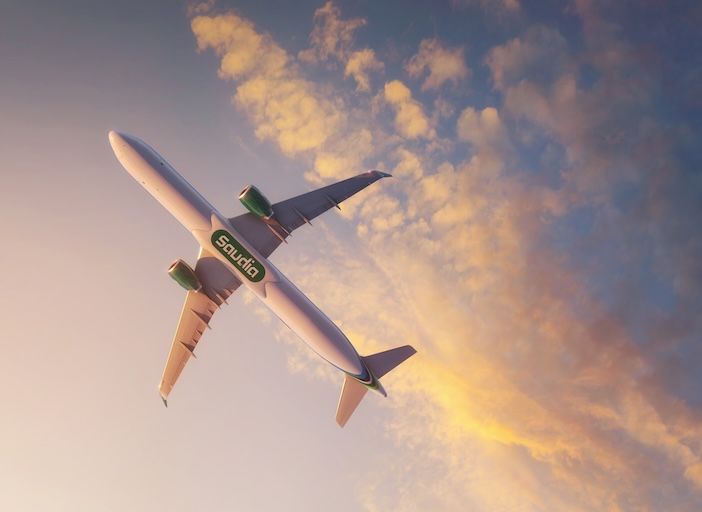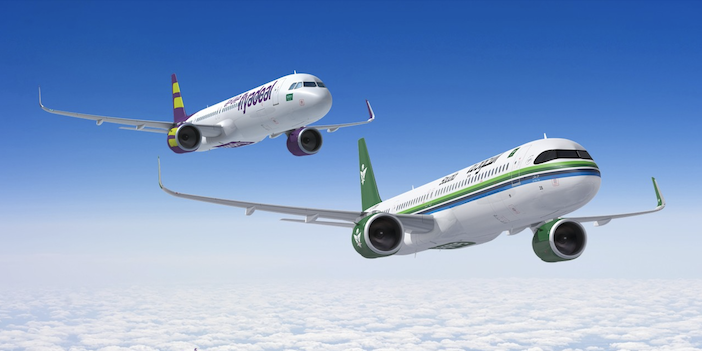The Future Aviation Forum, an event in Riyadh hosted by the General Authority of Civil Aviation (GACA) of Saudi Arabia, got off to a strong start, with Saudia announcing an agreement to purchase 93 Airbus A321 neos, and 12 A320 neos, at a cost of US$19 billion – the largest aircraft deal in Saudi aviation history.
Saudi Arabian Airlines (“Saudia”) is the national flag carrier of Saudi Arabia, with a current fleet of 140 aircraft servicing more than 100 destinations to and from the Jeddah (JDH) and Riyadh (RUH) airports. The new purchase agreement increases Saudia Group’s aircraft order backlog with Airbus to 144 A320neo family aircraft.
The 105 aircraft in the latest order will be distributed between Saudia and flyadeal, the group’s low-cost subsidiary carrier. Saudia will acquire 54 A321neo aircraft, while flyadeal will receive 12 A320neo and 39 A321neo aircraft. The flyadeal aircraft will be fitted with Acro Series 6 seating.
The order has been placed to support Saudia Group’s objectives to connect the world with the Kingdom, aligning with several key pillars of Saudi Vision 2030. These pillars include transportation and logistics objectives to increase guest capacity to 330 million and expand destinations to 250 by 2030, and the tourism objective to attract 150 million visits by 2030. This is in addition to the Hajj and Umrah objective of contributing to an increase of Umrah pilgrim capacity to 30 million by 2030.
The airline has also contracted Saudia Technic, the group’s maintenance, repair, and overhaul (MRO) arm, to provide comprehensive maintenance services, utilising the expanded capacity of its soon-to-be-completed ‘MRO Village’ at King Abdulaziz International Airport in Jeddah.

More show news – bold aviation goals
An estimated 5,000 delegates from more than 100 countries are expected to attend the Future Aviation Forum this week, with the purpose of elevating global connectivity.
Aside from the headline Saudia order, GACA also launched two reports that highlight the crucial role aviation plays in the Kingdom’s economic development.
The State of Aviation report found the Saudi aviation sector made a US$53 billion contribution to the Saudi economy and supported around 958,000 jobs across the country.
The regulator also used the forum to release its General Aviation Roadmap as a route to developing Saudi Arabia’s business jet and private industry.
With investments in six dedicated general aviation airports and other projects, the roadmap forecasts the sector will contribute around US$2 billion to GDP and create 35,000 new jobs by 2030.
His Excellency Abdulaziz Al Duailej, president of GACA stated, “Saudia’s purchase is a clear demonstration of the strength of the Saudi aviation sector, which saw a 26% increase in passengers and a 16% increase in flights in 2023. Aviation is a vital enabler of economic growth, trade, and social progress in the Kingdom. The State of Aviation report and the release of our General Aviation Roadmap demonstrate the growth and the potential of a world-class aviation ecosystem that supports Saudi Arabia’s strategic goals under Vision 2030.”
Salvatore Sciacchitano, president of the ICAO Council, International Civil Aviation Organization (ICAO) added, “Saudi Arabia is sending a loud and clear message to the international aviation community that it is a country focused on the future. Adopting and implementing aviation policies, fostering collaboration and partnerships, developing skills and talent, promoting sustainability and innovation, and leveraging technologies are crucial to enhancing global connectivity and ultimately supporting the social and economic development of our countries.”





